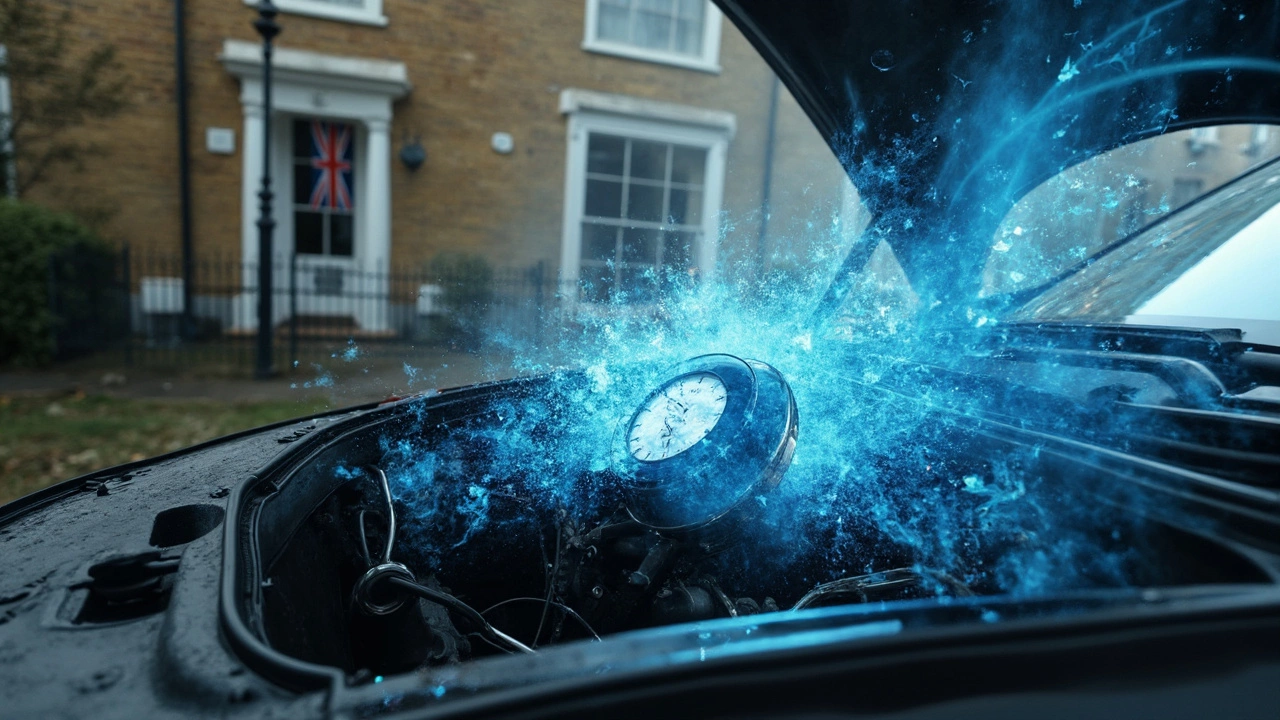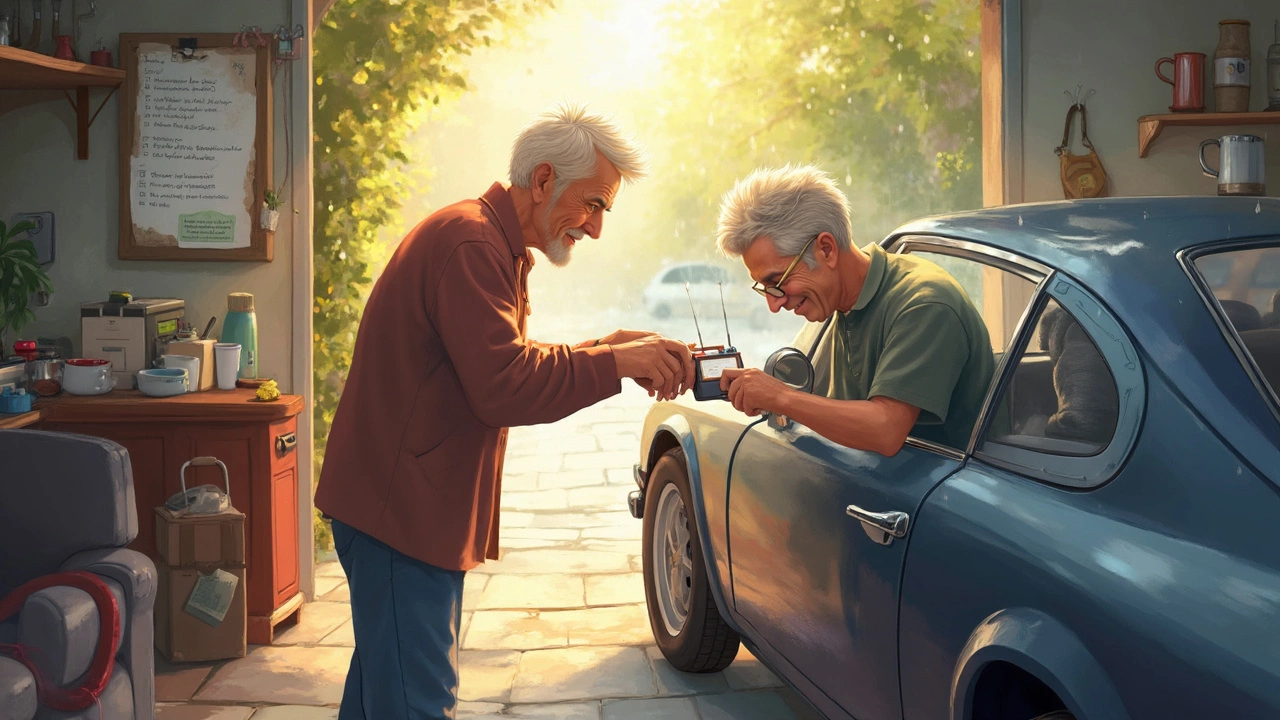Ever leave your car parked for a month and wonder if the battery will still have juice? Here’s the deal: car batteries don’t love sitting around doing nothing. Even if you don’t start the engine, they keep losing charge little by little. Alarms, clocks, and even the system that remembers your radio stations, all draw a tiny bit of power nonstop. So, yes, a car battery can absolutely go bad if it just sits there unused.
If your car sits for too long—think weeks or months—the battery can lose enough power that your engine won’t start at all. And it doesn’t even matter if the battery was pretty new. extreme heat, freezing cold, or just plain old age can speed up the process. Let’s talk about why this happens and what you can actually do to stop it before you end up stranded in your driveway.
- Why Sitting Idle Hurts Car Batteries
- How Long Before an Unused Battery Dies?
- Tips to Keep Your Battery Healthy in Storage
- Signs Your Battery Is Going Bad
- When It’s Time to Replace an Old Battery
Why Sitting Idle Hurts Car Batteries
It surprises a lot of folks, but car batteries really don't like doing nothing. When your car isn't being driven, the battery's charge slowly gets drained by little things running inside—like your clock, alarm, or the computer that manages the engine. These tiny energy users are called "parasitic loads" and they don't just turn off because your car is parked.
On top of that, all car batteries, even brand new ones, lose charge naturally over time. This is called self-discharge, and if you leave your car for a month or more, your battery can lose enough power that the engine won't start at all.
Sitting still also lets corrosion build up on battery terminals faster, and the electrolyte fluid inside the battery can start to stratify or even freeze in cold weather. If that happens, the battery may be permanently damaged—even after just one rough winter.
Here's what's working against your unused battery:
- Parasitic loads: Even shut-off cars need a trickle of power.
- Self-discharge: All batteries slowly lose charge, especially in hot climates.
- Corrosion: Not using the car lets rust and gunk build up on battery terminals.
- Electrolyte issues: If the fluid inside doesn't mix, it loses strength. In freezing weather, it can even turn to ice and swell up the casing.
Check out these real-world numbers—a well-maintained car battery can lose up to 1% of its charge every day sitting idle in hot weather. After a month of no driving, you're probably looking at a battery that's on its last legs, especially if it's more than three years old.
| Storage Condition | Discharge Rate per Month |
|---|---|
| Normal room temperature (70°F/21°C) | ~5% |
| Hot summer temperatures (>90°F/32°C) | Up to 20% |
| Freezing temperatures (<32°F/0°C) | ~2-3% |
The longer your car sits unused, the bigger the risk you'll walk out to a dead battery. That's why it's so important not to just park and forget about it if you want to avoid surprise repair bills.
How Long Before an Unused Battery Dies?
The timeline for a car battery losing its charge isn’t the same for everyone, but most healthy batteries hold out for about two weeks without any use before they start to get weak. If your car sits untouched for three or four weeks, don’t be surprised if you come back to a powerless battery. Leaving it even longer, like two months? At that point, most batteries are toast unless you used a trickle charger.
It’s not just about time, though. Hot climates will drain a battery faster than anywhere else, and super cold weather doesn’t help either. Older batteries—anything over three years—are also way more likely to die sooner, even if they’re left unused for just a couple weeks.
Here’s a simple breakdown of what usually happens when a battery sits idle:
- After about 2 weeks: The battery starts to lose enough charge that starting your car could be a struggle, especially in the winter.
- 3-4 weeks: Most modern cars won’t start reliably. The battery might only have enough power for lights, but not your engine.
- 2+ months: The battery can be fully discharged and sometimes won’t take a charge again—especially if it’s old or if temperatures were extreme during storage.
Check out this quick table showing what affects unused battery life:
| Factor | Impact on Battery Life |
|---|---|
| Age (over 3 years) | Faster discharge, likely dead after 2-3 weeks |
| Climate (hot/cold) | More rapid drain |
| Car electronics (alarms, GPS) | Constant small drain |
| Trickle charger use | Keeps battery healthy much longer |
So, if you’re storing your car for anything longer than two weeks, plan for some type of battery care. Otherwise, you’re rolling the dice on whether it’ll start when you need it.

Tips to Keep Your Battery Healthy in Storage
No one wants to deal with a surprise dead battery after leaving a car parked for a while. The good news? It doesn’t take a lot of work to keep your car battery happy and ready to go when you need it. Here’s what actually works:
- Start your car regularly: If possible, start your vehicle every week or two. Letting it run for about 15 minutes can help the battery top itself off. This keeps all the electronics working and prevents the battery from draining completely.
- Use a trickle charger: A trickle charger (also called a battery maintainer) is a small device that plugs in and delivers a steady, low charge. It’s honestly the best prevention for a dead battery if you leave your car unused for more than a month. Just hook it up, plug it in, and forget about battery anxiety.
- Disconnect the negative cable: If you know you won’t use the car for months, just disconnect the negative battery terminal (that’s the black one). This stops anything in the car from drawing power. When you come back, hook it up again and you should be good to go.
- Store your car in a cool, dry spot: Batteries hate heat—it speeds up chemical reactions that wear them out faster. If you can, put the car somewhere shady or climate-controlled. Avoiding direct sunlight and moisture keeps your car battery in better shape.
- Check battery terminals for corrosion: Before and after storage, peek at the battery posts. White, crusty stuff is corrosion, and it can mess with battery connections. Clean it off gently with a mix of baking soda and water, then dry everything before reconnecting.
Here’s a quick look at how common storage tips stack up in helping batteries last:
| Method | How Much It Helps | When You Should Use It |
|---|---|---|
| Trickle Charger | High | Car parked over 3 weeks |
| Engine Run Every 1-2 Weeks | Medium | Car parked up to 1 month |
| Disconnect Negative Cable | High | Storage over 1 month |
| Indoor/Shaded Storage | Medium | All storage durations |
If you follow these straightforward steps, your car battery is way less likely to leave you stranded. That’s one less headache to worry about when life finally needs you back on the road.
Signs Your Battery Is Going Bad
No one wants the surprise of a dead car battery, especially when running late. Luckily, batteries usually show warning signs before they totally fail. The trick is to spot them in time to avoid getting stuck.
The most obvious red flag? Your engine struggles to start. If you hear a slow chugging sound, or if the engine cranks a lot longer than usual, it’s likely not just the cold weather or a fluke. It can mean your battery is on its last legs. Headlights looking weak or dim—even with the car running—are another major clue. These things steal power straight from your car battery.
- Dashboard warning light (usually shaped like a battery)
- Electrical gremlins—like glitchy radio or power windows
- The infamous clicking sound when turning the key
- Needing to jump start more than once in a short time
- Corrosion or weird buildup around the battery terminals
If you notice any of those, it’s time to take a closer look. According to the team at AAA, “Most car batteries have a lifespan of three to five years, but that number gets shorter with extreme temperatures or long periods of not driving.”
“Car batteries often give subtle hints before they fail—keep an eye out for sluggish starts or dim lights, especially after the car sits unused.” — AAA Car Care
You can also check the age of your car battery. Most come with a date code sticker on top or the side. If you’re pushing past four years, just expect problems will show up sooner rather than later. Here’s a quick snapshot of battery lifespans based on climate:
| Climate | Average Battery Lifespan |
|---|---|
| Hot | 2-3 years |
| Cold | 4-5 years |
| Mild | 5+ years |
When your car battery is acting up, don’t wait for it to quit at the worst moment. Get it tested at an auto parts store—most places will check it for free. Catching trouble early means you won't be left stranded in a parking lot or your own driveway.

When It’s Time to Replace an Old Battery
So, when should you actually swap out your car battery? The answer isn’t just about the calendar. Sure, most car batteries last three to five years, but real life is messier than that. If your car sits unused, that lifespan shrinks. The signs are usually pretty loud, though. If your engine cranks slow, lights look weak, or you jump the battery more than once in a couple months, it’s time to think about a new one.
There are a few things you can check yourself before running to the store for a new battery. These are the most common red flags:
- Slow cranking when you turn the key
- Power windows, doors, or headlights acting sluggish
- Battery warning light flickering on the dash
- Visible corrosion or leaking fluid around the battery terminals
- The need to jump the battery more than once recently
If you pop the hood and the battery case looks bloated or cracked, don’t even mess with it. Old or damaged car batteries can leak acid and ruin cables or worse.
A battery test takes just a couple minutes at any auto parts shop—most places will do it for free. They’ll check the voltage and how well the battery holds power with a load test. A healthy car battery typically shows around 12.6 volts or more when fully charged. Below 12.4 volts, you're flirting with the danger zone.
| Age of Battery | Chance of Failure |
|---|---|
| Less than 3 years | Low |
| 3-5 years | Medium |
| 5+ years | High |
Bottom line? Don’t risk getting stuck with a dead car battery when you need your car most. If you notice these warning signs or your battery is already older than your phone, swap it out before it leaves you stranded.




